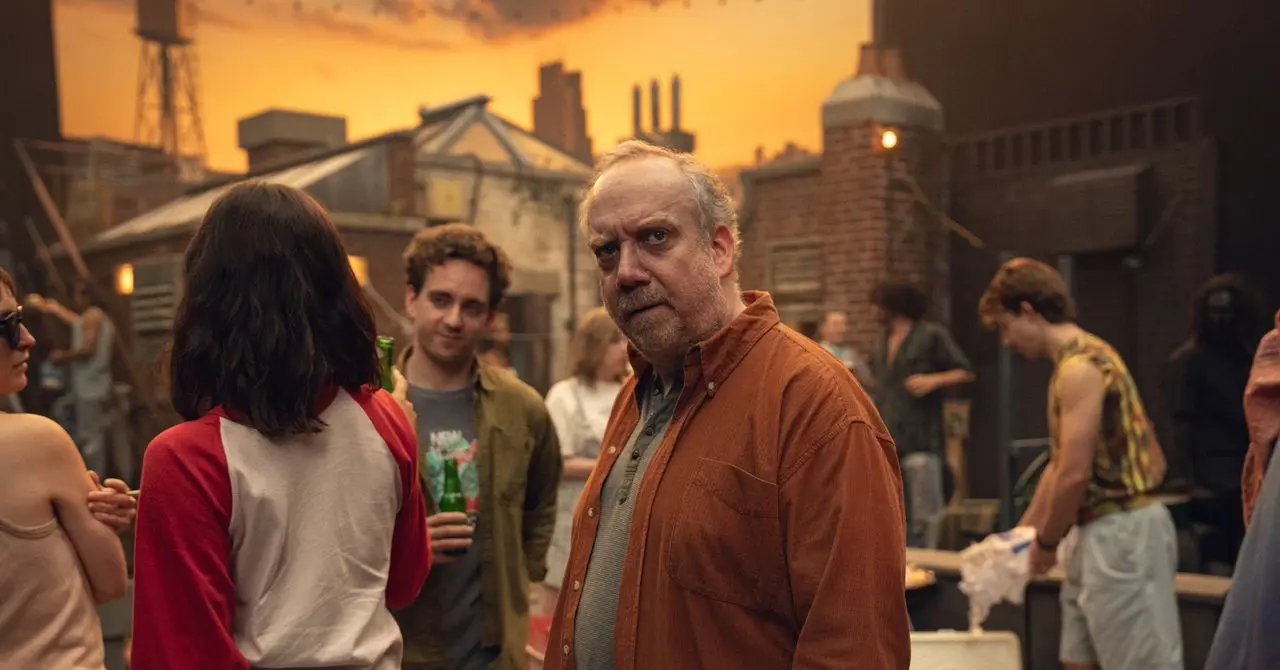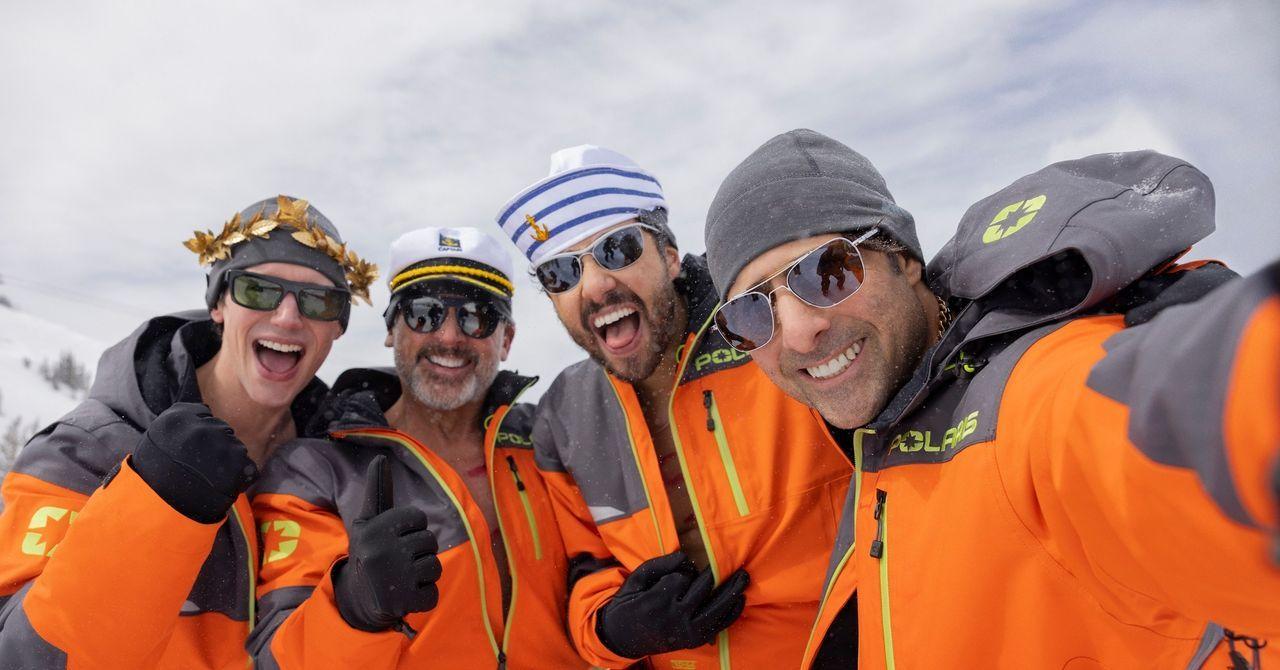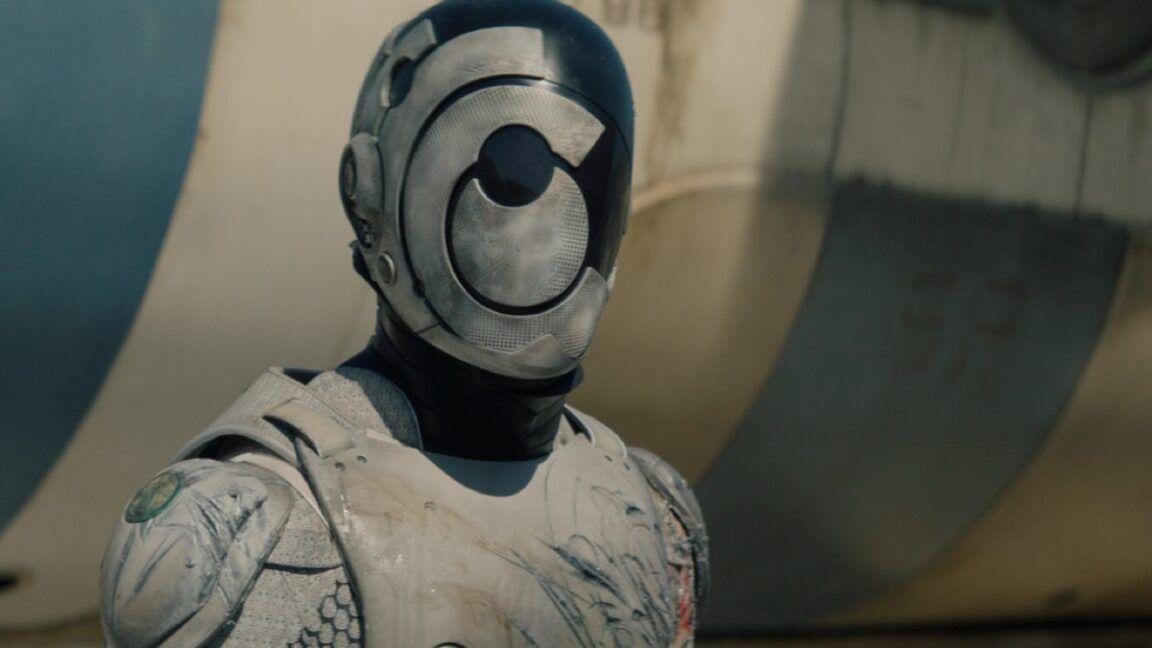Black Mirror Returns: AI, Nostalgia, and the Evolution of Dystopian Storytelling
2 Sources
2 Sources
[1]
Black Mirror star Paul Giamatti: 'AI is creepy and scary, but it's inevitable'
"I'm really surprised this is going so well," says Paul Giamatti early on in our conversation. It's a typically sardonic remark from the American actor famed for his Oscar-nominated roles in the mordant movies Sideways and The Holdovers and the TV show Billions. Yet the cause of his concern today is not existential but technological. "I'm an extremely wary user of technology," he says. "I always feel like I have some strange negative body charge or something, because nothing ever works for me." That we are speaking over Zoom seems fitting given the nature of the project we are here to discuss: an episode of the new season of Netflix's dystopian sci-fi series Black Mirror in which Giamatti plays a reclusive man asked to contribute to a memorial service for a person from his past. His guide on this Proustian journey is an AI played by Patsy Ferran who soon has him scouring his attic for old photographs. It's an analogue-first lifestyle to which Giamatti, 57, can relate. "I live in an apartment, so I don't have an attic, but I do have boxes of photographs and some stacks of dusty CDs. And I have a lot of books. I like books a lot." This might be expected from the son of pedagogues. The Connecticut-born Giamatti's mother was an English teacher and his father was a Yale professor of comparative literature who later became university president and, later still, the commissioner of Major League Baseball. Much of the Black Mirror episode, "Eulogy", involves Giamatti's character, Philip, being transported back to 1989 and a milieu of Brooklyn bars and loft parties where the air is filled with bong smoke and The Stone Roses. Was this what 1989 looked like for the 22-year-old Paul? "I lived in Seattle, but it was very similar," he recalls. "I was trying to know if I wanted to be an actor, doing acting related stuff and not knowing quite what I was. In Seattle at that time grunge was starting, so it was very much everybody in their lentil shirts doing bong hits in the apartment I lived in and listening to that music." The other new craze in town was a certain coffee chain. "I had a friend who worked at literally the first Starbucks, and it was like: wow, exciting! Coffee culture! I remember walking in and saying to her: this is never going to fly, who the hell is going to go buy coffee?" Inevitably, perhaps, the process of playing a man delving into his past prompted Giamatti to reflect on his own. "Sure, it made me think about mistakes made and misunderstandings and stupid things that you wish hadn't happened." But he is not one of those actors who use personal experiences to help them summon the required emotion for a scene. "I think I'm unconsciously drawing hugely on memories, but consciously I haven't done a whole lot of that," he says. "It tends to take me out of it if I start thinking about something that happened to me . . . And if something's well written, like this was, it'll affect me without my needing to draw on my own past." What Giamatti is inclined towards, irresistibly, is esoterica. A life-long passion for mysteries, conspiracies and hoaxes led him to create the podcast Chinwag, in which he and philosopher Stephen Asma pore over all manner of arcane subjects. He is also an avid reader of science fiction. "I've always been drawn to stuff like this since I was a little kid," Giamatti enthuses. "The Twilight Zone was a very big thing for me . . . And when Black Mirror started, I thought: somebody has actually really nailed the anthology weird fantastical thing. People have tried to reboot The Twilight Zone, and it's hard to do." Despite Black Mirror's technological leanings, however, use of CGI in "Eulogy" was kept to a minimum. A young version of Philip whom we see in interactive photographs is a lookalike actor, not a digital avatar conceived using Giamatti's de-aged likeness. "He just weirdly does look like me when I was that age," Giamatti says. "He actually looks a lot like cousins of mine, like in an uncanny, strange way. His eyes particularly." Similarly, when Philip steps into the photographs, the people around him frozen in time are played by live performers. "We weren't in front of a green screen, they were all there holding still for long takes, some of them in amazing, crazy positions . . . Most of them, I think, were dancers and mimes. It was so much weirder than I thought it was going be. It was eerie actually." However, for a self-confessed technophobe, Giamatti is surprisingly sanguine about the growing use of AI in the film and TV industry. "It's creepy and it's scary but, as much as I'm not a technophile, it's inevitable. There's no holding it back. It's not like you can put the genie back in the bottle . . . Do I want to sell my image to somebody? I mean I'm not for that, but I don't fault people who would do it." In fact, he has already appeared in a film that took on that very subject: 2013's little-seen live-action/animation The Congress, in which Robin Wright plays a version of herself who sells her likeness to a Hollywood studio to raise money to treat her son's illness. Giamatti is taken aback when I mention it. "You're the only person in my life that has ever mentioned that movie. I think it had a little funny kind of renaissance recently. People sort of discovered it and were like: somebody was talking about this and made a very strange movie about it. I'm not sure it makes sense entirely, but it was an interesting experience making it." Giamatti enthuses about the source text written by Polish sci-fi author Stanisław Lem and soon we have returned to the subject of memory. "There's another short story by Ted Chiang, a great science fiction writer. It's all about an AI that enhances your memory to the point you can remember everything, every second of your life from the time you're born to the time you're dying. And it's about the fact that maybe it's a good thing to be able to forget. Maybe it's important." The bittersweet tang that old memories can evoke is nicely captured in "Eulogy". In one scene, Philip takes an old roll of film to be developed and is asked the quaint question: "Matt or gloss?" Giamatti delivers the reply with a quantity of sardonicism that only he could: "Matt." I tell him that the moment made me think about his wider career and he immediately guffaws: "It's matt!" The self-deprecation is gleeful but there's an element of truth here too. Giamatti in person (even over Zoom) is a genial, jovial presence, so why has he spent the past 30 years playing curmudgeons? "I don't know, it's really interesting, and it gets into all kinds of questions about actors and personas and why people are perceived the way they are. A lot of it has just been what people have wanted me to do over the years. I think it's a thing that can happen with character actors -- whatever 'character actor' means, and I don't really necessarily know. It's the first thing people see you do, and so you're asked to do it again." When I ask what the part was that triggered all this, the origin story of his onscreen grouchiness, he takes me back to 1997. "I did a movie a long time ago called Private Parts about Howard Stern in which I played an extremely unpleasant person, and it really stuck for a while. I don't know why I'm good at it. Am I drawing on something unconsciously? Like, I'm not actually very much like this, so it's fun to be like that in the parts? Or is it that there is some part of me that I try to repress that comes out in them? I don't know." Some have been miserable, others plain nasty. Perhaps the nastiest of them all was fearsome attorney Chuck Rhoades, a pit bull in pinstripes, in the long-running TV series Billions. "He was fun to play but he was such an unpleasant person that seven years of that got hard," Giamatti reveals. "After a while, you're like, Jesus Christ, this guy is so unpleasant, he's such a conniving human being and never did the right thing for the right reason ever." Maybe it says good things about him that he found it wearing to play such a monster. "There's an interesting phenomenon," Giamatti observes. "It's not true all the time, it's a generalisation, but so often the people who play bad guys and bastards in movies are the nicest people. And sometimes the opposite is true. The people who play the sweethearts are not." By that reckoning, Giamatti must be the sweetest of them all. "Oh, I'm not saying I'm the most pleasant person in the world," he chuckles. "I can be unpleasant. Believe me."
[2]
'If you want dystopia, look out your window!' Black Mirror is back - and going beyond tech hell
After years of creating dark, disturbing, thought-provoking TV, Charlie Brooker is changing it up. The creator and star-studded cast of Black Mirror talk about why this season is the most moving and vulnerable yet Charlie Brooker has been contemplating the passing of time, and he's not happy about it. We're on set at Shepperton for USS Callister: Into Infinity, the sequel to the 2017 space opera from his terrifying tech anthology Black Mirror. "The cast don't seem to have aged at all," he grumbles, "whereas I am a wizened old gentleman." There is a more reflective, almost nostalgic tone to this seventh season. The episode Plaything flashes back to Brooker's early years as a gaming journalist in a Bandersnatch-adjacent slice of computer-induced madness; Eulogy immerses Paul Giamatti in his memories as he literally enters decades-old photos; gaslighting parable Bête Noire forces Siena Kelly's chocolatier to reckon with youthful misdemeanours; Hotel Reverie stars Emma Corrin as a 1940s matinee idol falling for Issa Rae's modern film star, who plays her white, male love interest in an AI remake of a vintage romance. "Quite a lot of the technology is being used to relive things or bring them back into the present," concedes Brooker. "It wasn't conscious, but then I have a lot more past than future. There's probably more social commentary and more emotive or vulnerable episodes. That doesn't mean we don't go to disturbing places or deliver those chills, but people come to Black Mirror expecting to be surprised, so you can't give them exactly what they want. I'd say there's a little less dystopia. If you want that, there's a 24-hour panel showing it called your window. You don't necessarily want to see something saying: things are going to get worse." Brooker, fed up with Zoom (him) and Roblox (his sons, now 13 and 11) during the pandemic, opted to sideline tech in favour of other genres for season six, notably the bleak horror of Mazey Day, Demon 79 and Loch Henry. This year brings a return to what Brooker terms "trad" Black Mirror: the science that could yet come to define our lives. Nowhere is this clearer than in Common People, an allegory of private healthcare and the concept of "enshittification". Chris O'Dowd agrees to revolutionary, life-saving treatment for his wife (Rashida Jones) but, over time, the excessive price tag leaves them in penury even as the aftercare gets shoddier and Jones becomes a walking pop-up ad. Likewise, USS Callister: Into Infinity. The first episode saw sad-sack coding genius Robert Daly (Jesse Plemons) use his co-workers' DNA to trap their clones in his multiplayer game Infinity, where he could torment and abuse them at will. Following a revolt led by both real and virtual versions of Cristin Milioti's programmer Nanette and, more reluctantly, the avatar of toxic CEO Walton (Jimmi Simpson), Daly was killed and the cloned crew ventured into a universe that, we now discover, isn't the paradise they imagined. "They're in a minute-by-minute scrap for survival," reveals Brooker. "Everyone else there is a player in a game who will idly blow your head off if they see you, whereas the clones can bleed and die." While Plemons's absence is felt on the set of the Callister's bridge, consolation comes in the shape of Simpson, filthy, hirsute and gamely rocking a loincloth exposing both real buttock and prosthetic scrotum. Back in his trailer, fully clothed and cleaned up, Simpson is delighted by the effect. "It made sense because Walton has been stripped of everything. He's a buffoon, so throw in some bullocks [sic] and lock that giggle in. I'm here for whatever sight gag they want. I'd be a short-order cook for Charlie if that would make him happy." Simpson's devotion is shared by Milioti, whose plans for a Callister reprise with Brooker were derailed by Covid, strikes and schedule clashes. In the interim, her performance as the fabulously monstrous Sofia Falcone in The Penguin has made her a star. "I filmed this two weeks after wrapping The Penguin, so it felt like being ricocheted into a whole new world," she says. "Sofia and Nanette - both of her! - certainly felt very different to embody." Into Infinity's aesthetic is now more inspired by the Star Trek of JJ Abrams than the Shatner era of Big Acting and sexual objectification that was the touchstone of the original episode. Everything is a little shinier. An LED wall has replaced green screen for the ship's windows, enabling the actors to respond to images in real time as they flash up. The teleporters glow, the controls are responsive (dials can be twiddled, joysticks grabbed and levers thrust forward for that hyperwarp effect) and the sliding doors really do go whoosh - at least when Milioti's around. "It is an incredible feeling to experience your own brain being tricked," she says, laughing. "There's something about a 3D-printed space laser that immediately makes you eight years old again. It's so difficult to not make the sound, so I did. Constantly." Black Mirror has always sprinkled Easter eggs liberally around its many worlds (Into Infinity includes a news ticker update on Michael Callow, Rory Kinnear's PM whose porcine intercourse launched the show with a bang in 2011), but until now has never repeated itself. Brooker, whose only returning character of note has been the antithesis of evolution, Philomena Cunk, responds to the charge with mock incredulity - "we've never repeated ourselves before, so it's actually a very new thing to do ..." - but writing the crew's further adventures proved irresistible after the first episode's cliffhanger. USS Callister is the only Black Mirror so far seen by Brooker's sons, after he belatedly realised this "relatively benign" instalment was in fact "pouring nightmare fuel into their brains". It also aired just as news of Harvey Weinstein's abuse broke, making it one of Brooker's most prescient episodes in its exposure of incel culture in gaming and beyond. "We flip the toxicity discussion in this episode," says Brooker's fellow executive Jessica Rhoades. "There's a scene where a character, who sees themselves as a nice person, cannot contemplate another version of themselves. It speaks to nice-guy culture with a real understanding of someone's isolation, while also asking: why should your loneliness and anger dictate what happens to my body? But that's a little more in the background this time." Simpson, a lapsed gamer, has form in cerebral futurology with Westworld and Apple TV+'s Dark Matter. "I will never tire of doing sci-fi," he says. "Anything can happen and it's all relevant. In Callister, Charlie's looking at what it means to be you: whether we're defined by how we treat others, their perceptions of us or by something like a soul." "What would it mean to have a complete copy of you running around this universe?" adds Brooker. "Are they experiencing real emotion? Do they deserve our empathy? We'll be dealing with that more and more as AI gets more sophisticated. We already project a lot on to it and there'll come a point, presumably, where it will qualify as a living thing." Milioti sounds a note of caution. "We've made so much art warning ourselves about what could happen, and now it's happening. I understand the benefits of some AI but, because it's been designed by us, it will be flawed like us. Sometimes that means it comes up with a stupid summary of a movie. At other times, will it want to destroy in the way we want to destroy? I don't understand why you would want to introduce this into the world when we still have ancient animal brains. It makes me really anxious, the idea of creating content at all costs and profit being more important than people." Does Into Infinity place the blame for this age of anxiety at the feet of tech bros? From Musk to Bezos, they certainly seem to share Daly's petty grievances and Walton's venal avarice. "There's definitely an element of that," agrees Brooker. "But it's just big business and the age-old thing of money and power corrupting. The optimistic part of me, which is admittedly undeveloped, would like to think people don't go into things with malevolent intentions. And it frustrates me when people describe the show as a warning about the use of technology because the technology is neutral. It might be misused, but it might also be something that gets us out of this fucking mess. You can't put the genie back in the bottle, so it's about dealing with a new set of circumstances. We just can't lose people from the equation." As a family man, Brooker - "the most empathetic father I've ever seen," reckons Rhoades - has some extra skin in the game. "If I play my hand too overtly, my sons will get all secretive about this stuff," he shrugs. "Luckily, they haven't got bogged down in the Andrew Tate world of algorithms spewing up shit, but I do worry about them sitting there in front of YouTube and then before you know it ..." He grimaces. "I've installed all the parental controls you can, but it's more that I'm struggling to keep up with the weird things they'll come out with. [Bizarre YouTube animation] Skibidi Toilet is their pop music, their equivalent of 'Turn that noise down!' I'd have been into that at their age, I reckon." It could be worse. They could be back watching their dad's handiwork. "When one of my sons was about six, he came back from school and said: 'Dad, do you do a show called Black Mirror?' And I went: 'Yeeeees ... What do you think happens in Black Mirror?' He said: 'Is it where a man loves a pig?' And I thought: 'Oh, Christ ...'"
Share
Share
Copy Link
The latest season of Black Mirror explores AI, memory, and the passage of time, featuring Paul Giamatti and returning to its technological roots while embracing a more reflective tone.

Black Mirror's New Season Blends AI and Nostalgia
The critically acclaimed dystopian series Black Mirror is set to return with its seventh season, promising a fresh take on its signature blend of technology and human drama. Creator Charlie Brooker has hinted at a shift in tone, moving towards more reflective and emotive storytelling while still maintaining the show's core focus on technological speculation
2
.Paul Giamatti Stars in "Eulogy"
One of the season's standout episodes, "Eulogy," features Oscar-nominated actor Paul Giamatti. The story revolves around Giamatti's character, Philip, a reclusive man who interacts with an AI (played by Patsy Ferran) to contribute to a memorial service. This episode delves into themes of memory and nostalgia, with Philip literally stepping into old photographs to revisit his past
1
.Giamatti, known for his technophobic tendencies, found the experience of filming "Eulogy" both eerie and fascinating. He noted the minimal use of CGI, with real performers posing as frozen figures in the photographs, creating an uncanny atmosphere on set
1
.AI and the Entertainment Industry
Despite his personal wariness of technology, Giamatti expressed a pragmatic view on the increasing use of AI in the film and TV industry. He acknowledged its inevitability, stating, "It's creepy and it's scary but, as much as I'm not a technophile, it's inevitable. There's no holding it back"
1
.This sentiment aligns with the themes explored in the new season of Black Mirror, which examines how technology is used to relive or bring back elements of the past
2
.A Shift in Black Mirror's Approach
Charlie Brooker, the show's creator, has indicated a slight departure from the series' typically dystopian outlook. "There's probably more social commentary and more emotive or vulnerable episodes," Brooker explained. He emphasized the need to surprise viewers while still delivering the chills and thought-provoking content that Black Mirror is known for
2
.Related Stories
Technological Themes and Returning Characters
The new season marks a return to what Brooker calls "trad" Black Mirror, focusing on potential future technologies and their impact on society. Episodes like "Common People" explore concepts such as private healthcare and "enshittification" in a technological context
2
.Notably, the season includes "USS Callister: Into Infinity," a sequel to a popular episode from a previous season. This marks the first time Black Mirror has revisited characters and storylines, adding a new dimension to the anthology series
2
.Production and Visual Effects
The production of the new season has embraced cutting-edge technology to enhance storytelling. For instance, "USS Callister: Into Infinity" utilizes LED walls instead of green screens, allowing actors to respond to real-time visual effects. This approach, combined with practical effects and set designs, creates a more immersive experience for both actors and viewers
2
.As Black Mirror continues to evolve, this season promises to offer a unique blend of technological speculation, emotional depth, and social commentary, reflecting on our relationship with technology and the passage of time in increasingly complex ways.
References
Summarized by
Navi
Related Stories
'Black Mirror' Episode 'Eulogy' Explores AI's Role in Grief and Memory
11 Apr 2025•Technology

Black Mirror Season 7 Explores AI's Impact on Entertainment and Society
11 Apr 2025•Entertainment and Society

Jesse Armstrong's 'Mountainhead': A Satirical Take on Tech Billionaires and AI
27 May 2025•Technology

Recent Highlights
1
Google Gemini 3.1 Pro doubles reasoning score, beats rivals in key AI benchmarks
Technology

2
Meta strikes up to $100 billion AI chips deal with AMD, could acquire 10% stake in chipmaker
Technology

3
Pentagon threatens Anthropic with supply chain risk label over AI safeguards for military use
Policy and Regulation





